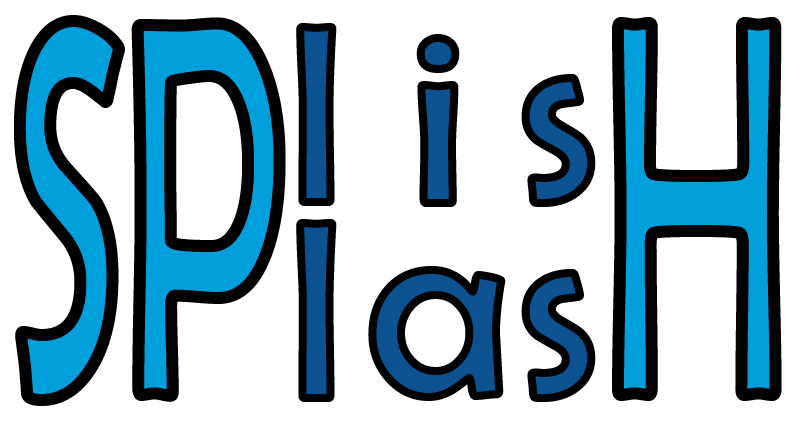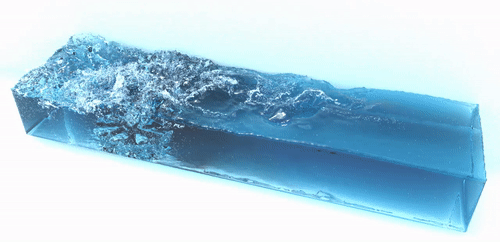SPlisHSPlasH Project Python Bindings
Project description


SPlisHSPlasH is an open-source library for the physically-based simulation of fluids. The simulation in this library is based on the Smoothed Particle Hydrodynamics (SPH) method which is a popular meshless Lagrangian approach to simulate complex fluid effects. The SPH formalism allows an efficient computation of a certain quantity of a fluid particle by considering only a finite set of neighboring particles. One of the most important research topics in the field of SPH methods is the simulation of incompressible fluids. SPlisHSPlasH implements current state-of-the-art pressure solvers (WCSPH, PCISPH, PBF, IISPH, DFSPH, PF) to simulate incompressibility. Moreover, the library provides different methods to simulate viscosity, surface tension and vorticity.
The library uses the following external libraries: Eigen, json, partio, zlib, cxxopts, tinyexpr, toojpeg, pybind, glfw, hapPLY, nfd, and imgui. All external dependencies are included.
Furthermore we use our own libraries:
- PositionBasedDynamics to simulate dynamic rigid bodies
- Discregrid to detect collisions between rigid bodies
- CompactNSearch to perform the neighborhood search
- cuNSearch to perform the neighborhood search on the GPU
- GenericParameters to handle generic parameters
SPlisHSPlasH can export the particle data in the partio and vtk format. If you want to import partio files in Maya or Blender, try out our plugins:
Author: Jan Bender
License
The SPlisHSPlasH library code is licensed under the MIT license. See LICENSE for details.
External dependencies are covered by separate licensing terms. See the extern folder for the code and respective licensing terms of each dependency.
Documentation
Forum
On our GitHub discussions page you can ask questions, discuss about simulation topics, and share ideas.
Build Instructions
This project is based on CMake. Simply generate project, Makefiles, etc. using CMake and compile the project with a compiler of your choice that supports C++11. The code was tested with the following configurations:
- Windows 10 64-bit, CMake 3.18.3, Visual Studio 2019
- Debian 11.5 64-bit, CMake 3.18.4, GCC 10.2.1.
Note: Please use a 64-bit target on a 64-bit operating system. 32-bit builds on a 64-bit OS are not supported.
Python Installation Instruction
For Windows and Linux targets there exists prebuilt python wheel files which can be installed using
pip install pysplishsplash
These are available for Python versions 3.6-3.10. See also here: pySPlisHSPlasH. If you do not meet these conditions please refer to the build instructions and to the python binding Getting started guide.
The command line simulator is available by running one of the following
splash
splash --help
Features
SPlisHSPlasH implements:
- an open-source SPH fluid simulation (2D & 3D)
- neighborhood search on CPU or GPU
- supports vectorization using AVX
- Python binding (thanks to Stefan Jeske)
- supports embedded Python scripts
- several implicit pressure solvers (WCSPH, PCISPH, PBF, IISPH, DFSPH, PF)
- explicit and implicit viscosity methods
- current surface tension approaches
- different vorticity methods
- computation of drag forces
- support for multi-phase simulations
- simulation of deformable solids
- rigid-fluid coupling with static and dynamic bodies
- two-way coupling with deformable solids
- XSPH velocity filter
- fluid emitters
- scripted animation fields
- a json-based scene file importer
- automatic surface sampling
- a tool for volume sampling of closed geometries
- a tool to generate spray, foam and bubble particles in a postprocessing step
- a tool to skin a visual mesh to the moving particles of an elastic solid in a postprocessing step
- partio file export of all particle data
- VTK file export of all particle data (enables the data import in ParaView)
- rigid body export
- a Maya plugin to model and generate scene files
- a ParaView plugin to import particle data
A list of all implemented simulation methods can be found here: https://splishsplash.physics-simulation.org/features
Screenshots & Videos
https://splishsplash.physics-simulation.org/gallery
Citation
To cite SPlisHSPlasH you can use this BibTeX entry:
@software{SPlisHSPlasH_Library,
author = {Bender, Jan and others},
license = {MIT},
title = {{SPlisHSPlasH Library}},
url = {https://github.com/InteractiveComputerGraphics/SPlisHSPlasH},
}
Project details
Release history Release notifications | RSS feed
Download files
Download the file for your platform. If you're not sure which to choose, learn more about installing packages.
Source Distributions
Built Distributions
Filter files by name, interpreter, ABI, and platform.
If you're not sure about the file name format, learn more about wheel file names.
Copy a direct link to the current filters
File details
Details for the file pysplishsplash-2.16.0-cp313-cp313-win_amd64.whl.
File metadata
- Download URL: pysplishsplash-2.16.0-cp313-cp313-win_amd64.whl
- Upload date:
- Size: 4.0 MB
- Tags: CPython 3.13, Windows x86-64
- Uploaded using Trusted Publishing? No
- Uploaded via: twine/6.2.0 CPython/3.12.10
File hashes
| Algorithm | Hash digest | |
|---|---|---|
| SHA256 |
d07c33b4a03663d2dc6a878837de8b8bd5bef229a702cbb2df82acf52656e4f8
|
|
| MD5 |
74ccbd083fea099eaf36e4e8ed7b0b2b
|
|
| BLAKE2b-256 |
0750be4d649d8e155834724865a6e0d8db2adbdad8a02fd29da1dd732f547494
|
File details
Details for the file pysplishsplash-2.16.0-cp313-cp313-manylinux_2_27_x86_64.manylinux_2_28_x86_64.whl.
File metadata
- Download URL: pysplishsplash-2.16.0-cp313-cp313-manylinux_2_27_x86_64.manylinux_2_28_x86_64.whl
- Upload date:
- Size: 5.2 MB
- Tags: CPython 3.13, manylinux: glibc 2.27+ x86-64, manylinux: glibc 2.28+ x86-64
- Uploaded using Trusted Publishing? No
- Uploaded via: twine/6.2.0 CPython/3.12.12
File hashes
| Algorithm | Hash digest | |
|---|---|---|
| SHA256 |
cfb825dd38fae1c14e4416c84094de55657735a1b60d84bba22a05e04207d76c
|
|
| MD5 |
1e6064b50b53f70f95b52db99d609ee8
|
|
| BLAKE2b-256 |
fba77f02950219f2cd0f07b2d20e03ed908e7260410b17434a327f793cbccfb9
|
File details
Details for the file pysplishsplash-2.16.0-cp313-cp313-macosx_15_0_arm64.whl.
File metadata
- Download URL: pysplishsplash-2.16.0-cp313-cp313-macosx_15_0_arm64.whl
- Upload date:
- Size: 4.2 MB
- Tags: CPython 3.13, macOS 15.0+ ARM64
- Uploaded using Trusted Publishing? No
- Uploaded via: twine/6.2.0 CPython/3.12.10
File hashes
| Algorithm | Hash digest | |
|---|---|---|
| SHA256 |
e52300041820e8dd570f2b3b4a854f68c6da3a617fac4372645399192fa497e5
|
|
| MD5 |
b981c954f1331f9fab169fac4e7b1978
|
|
| BLAKE2b-256 |
641f9de7c093d1dc8473e6fb84aae2e9a04e346068bfa6b104e0b10389f201d0
|
File details
Details for the file pysplishsplash-2.16.0-cp312-cp312-win_amd64.whl.
File metadata
- Download URL: pysplishsplash-2.16.0-cp312-cp312-win_amd64.whl
- Upload date:
- Size: 4.0 MB
- Tags: CPython 3.12, Windows x86-64
- Uploaded using Trusted Publishing? No
- Uploaded via: twine/6.2.0 CPython/3.12.10
File hashes
| Algorithm | Hash digest | |
|---|---|---|
| SHA256 |
a74b0d05cd198f6adfb950e46dddca57ad2f2030b07f7451baeaf98094f62e9c
|
|
| MD5 |
942dc3c670e31641b74783846a27f5a9
|
|
| BLAKE2b-256 |
239d28c5f0102f2566e9533a1761f546057752b03aed7767cdf30b706d2afc57
|
File details
Details for the file pysplishsplash-2.16.0-cp312-cp312-manylinux_2_27_x86_64.manylinux_2_28_x86_64.whl.
File metadata
- Download URL: pysplishsplash-2.16.0-cp312-cp312-manylinux_2_27_x86_64.manylinux_2_28_x86_64.whl
- Upload date:
- Size: 5.2 MB
- Tags: CPython 3.12, manylinux: glibc 2.27+ x86-64, manylinux: glibc 2.28+ x86-64
- Uploaded using Trusted Publishing? No
- Uploaded via: twine/6.2.0 CPython/3.12.12
File hashes
| Algorithm | Hash digest | |
|---|---|---|
| SHA256 |
e028fc5d29ca83c44cfde1840900f0050ba824111019feb822e5c6584c3bb4dd
|
|
| MD5 |
8004314f1bc528a68729dbf32cdc6a66
|
|
| BLAKE2b-256 |
607953fdbfa845ae777f9473c570587bebc4543c965325bed2e4678e25fa82a8
|
File details
Details for the file pysplishsplash-2.16.0-cp312-cp312-macosx_15_0_arm64.whl.
File metadata
- Download URL: pysplishsplash-2.16.0-cp312-cp312-macosx_15_0_arm64.whl
- Upload date:
- Size: 4.2 MB
- Tags: CPython 3.12, macOS 15.0+ ARM64
- Uploaded using Trusted Publishing? No
- Uploaded via: twine/6.2.0 CPython/3.12.10
File hashes
| Algorithm | Hash digest | |
|---|---|---|
| SHA256 |
0c573cc5bb6c669f3611dc17d36aa4caecb61add5bd1bf5f5f532f426c64d0f0
|
|
| MD5 |
cfae366d853edb2db09c8019d86f961f
|
|
| BLAKE2b-256 |
9fe7c9bae1704884438e9ac979edced642b04d64708497b62d66b36857888aa3
|
File details
Details for the file pysplishsplash-2.16.0-cp311-cp311-win_amd64.whl.
File metadata
- Download URL: pysplishsplash-2.16.0-cp311-cp311-win_amd64.whl
- Upload date:
- Size: 4.0 MB
- Tags: CPython 3.11, Windows x86-64
- Uploaded using Trusted Publishing? No
- Uploaded via: twine/6.2.0 CPython/3.12.10
File hashes
| Algorithm | Hash digest | |
|---|---|---|
| SHA256 |
a162c5e08fe0a65055713499e9c3b150951c69c6a58cd529940a643e2b1a734b
|
|
| MD5 |
4c18c96ce50dbc38c84087f883ee53ed
|
|
| BLAKE2b-256 |
647c957223a70623906775eb7e82582ab3ff730517cee0072c6fbca9aab56b64
|
File details
Details for the file pysplishsplash-2.16.0-cp311-cp311-manylinux_2_27_x86_64.manylinux_2_28_x86_64.whl.
File metadata
- Download URL: pysplishsplash-2.16.0-cp311-cp311-manylinux_2_27_x86_64.manylinux_2_28_x86_64.whl
- Upload date:
- Size: 5.3 MB
- Tags: CPython 3.11, manylinux: glibc 2.27+ x86-64, manylinux: glibc 2.28+ x86-64
- Uploaded using Trusted Publishing? No
- Uploaded via: twine/6.2.0 CPython/3.12.12
File hashes
| Algorithm | Hash digest | |
|---|---|---|
| SHA256 |
a4616311d64382c6f5e4ca6d47b2b70b1a96a667c9592013b2bbc38acb623ae7
|
|
| MD5 |
2ad38c209f8a57e502fb5852f280f129
|
|
| BLAKE2b-256 |
99cfa9be0a66b055a8916a28d9f7210649dede3c75c2318ed1736fa4c23caafb
|
File details
Details for the file pysplishsplash-2.16.0-cp311-cp311-macosx_15_0_arm64.whl.
File metadata
- Download URL: pysplishsplash-2.16.0-cp311-cp311-macosx_15_0_arm64.whl
- Upload date:
- Size: 4.2 MB
- Tags: CPython 3.11, macOS 15.0+ ARM64
- Uploaded using Trusted Publishing? No
- Uploaded via: twine/6.2.0 CPython/3.12.10
File hashes
| Algorithm | Hash digest | |
|---|---|---|
| SHA256 |
a3bb0d13feba78a1001376681bd9ca55a0f141912a864857e415cac42c38c532
|
|
| MD5 |
b2db817136b6ce043280095565fa9457
|
|
| BLAKE2b-256 |
37a70b4f62e8b22cd19468e7aecc95a8e4d4b6887562b5e5749b757cccaa1dc6
|
File details
Details for the file pysplishsplash-2.16.0-cp310-cp310-win_amd64.whl.
File metadata
- Download URL: pysplishsplash-2.16.0-cp310-cp310-win_amd64.whl
- Upload date:
- Size: 4.0 MB
- Tags: CPython 3.10, Windows x86-64
- Uploaded using Trusted Publishing? No
- Uploaded via: twine/6.2.0 CPython/3.12.10
File hashes
| Algorithm | Hash digest | |
|---|---|---|
| SHA256 |
bfb4e41d17bb9ca6f11d235ebbbe370adb4f728b8f3ac930611a0b5164273764
|
|
| MD5 |
7a9d0922004e9809cde76f888664f28f
|
|
| BLAKE2b-256 |
8391df7f1d95c0f881624213b190e5d19b9e8b73efd754d4e82618c9382ae120
|
File details
Details for the file pysplishsplash-2.16.0-cp310-cp310-manylinux_2_27_x86_64.manylinux_2_28_x86_64.whl.
File metadata
- Download URL: pysplishsplash-2.16.0-cp310-cp310-manylinux_2_27_x86_64.manylinux_2_28_x86_64.whl
- Upload date:
- Size: 5.3 MB
- Tags: CPython 3.10, manylinux: glibc 2.27+ x86-64, manylinux: glibc 2.28+ x86-64
- Uploaded using Trusted Publishing? No
- Uploaded via: twine/6.2.0 CPython/3.12.12
File hashes
| Algorithm | Hash digest | |
|---|---|---|
| SHA256 |
715ffa364ade85cd5dc52de089cd3ea7506c18be723c3fc3d658916b2d8ab563
|
|
| MD5 |
a87ad5b30e17b0068f1a8d5c0a0d06bc
|
|
| BLAKE2b-256 |
e3aa04cb83679344f51efec210a2a586362993dd1547e02c879976ac3f6b76c5
|
File details
Details for the file pysplishsplash-2.16.0-cp310-cp310-macosx_15_0_arm64.whl.
File metadata
- Download URL: pysplishsplash-2.16.0-cp310-cp310-macosx_15_0_arm64.whl
- Upload date:
- Size: 4.2 MB
- Tags: CPython 3.10, macOS 15.0+ ARM64
- Uploaded using Trusted Publishing? No
- Uploaded via: twine/6.2.0 CPython/3.12.10
File hashes
| Algorithm | Hash digest | |
|---|---|---|
| SHA256 |
493936f85e45329232ab897f2e5e2ba6a0f8ca09b828fab16b0888c477c01599
|
|
| MD5 |
12f9eedb4e9e7be5fd112e04a1ada756
|
|
| BLAKE2b-256 |
5e2998c681b66cb809b751e8fd00ffa87220159e78f2f98a020230be30bcc589
|
File details
Details for the file pysplishsplash-2.16.0-cp39-cp39-win_amd64.whl.
File metadata
- Download URL: pysplishsplash-2.16.0-cp39-cp39-win_amd64.whl
- Upload date:
- Size: 4.0 MB
- Tags: CPython 3.9, Windows x86-64
- Uploaded using Trusted Publishing? No
- Uploaded via: twine/6.2.0 CPython/3.12.10
File hashes
| Algorithm | Hash digest | |
|---|---|---|
| SHA256 |
be4d8041b418b55beb5a39d37aa224fa9b94f6e6deb0e0fd9406c7c80d6bbf8e
|
|
| MD5 |
1ba50808bca2f402d0a4d2bad20f89c2
|
|
| BLAKE2b-256 |
a8bb4e4952afccaf6d0729616411059654e81207312435e1670a1b7558b9ca92
|
File details
Details for the file pysplishsplash-2.16.0-cp39-cp39-manylinux_2_27_x86_64.manylinux_2_28_x86_64.whl.
File metadata
- Download URL: pysplishsplash-2.16.0-cp39-cp39-manylinux_2_27_x86_64.manylinux_2_28_x86_64.whl
- Upload date:
- Size: 5.3 MB
- Tags: CPython 3.9, manylinux: glibc 2.27+ x86-64, manylinux: glibc 2.28+ x86-64
- Uploaded using Trusted Publishing? No
- Uploaded via: twine/6.2.0 CPython/3.12.12
File hashes
| Algorithm | Hash digest | |
|---|---|---|
| SHA256 |
72887e3b5eb303d0e89c66de0a3d093c21ff93612b09491bbd2e2b850c65b837
|
|
| MD5 |
2b88af196eedc04f4c4d36258ff41af9
|
|
| BLAKE2b-256 |
a08cde97206e16f810604fb2ce6f0b05794dbe3040e30bfcecd817b10be6dae4
|
File details
Details for the file pysplishsplash-2.16.0-cp39-cp39-macosx_15_0_arm64.whl.
File metadata
- Download URL: pysplishsplash-2.16.0-cp39-cp39-macosx_15_0_arm64.whl
- Upload date:
- Size: 4.2 MB
- Tags: CPython 3.9, macOS 15.0+ ARM64
- Uploaded using Trusted Publishing? No
- Uploaded via: twine/6.2.0 CPython/3.12.10
File hashes
| Algorithm | Hash digest | |
|---|---|---|
| SHA256 |
6f423e781d016d5f0415745936ae5ce5df653cb9e4bddb7337302bc508aad466
|
|
| MD5 |
69c54f89a774ed6e5ee46f5c1153aa71
|
|
| BLAKE2b-256 |
7a932679f473c9b096e306e3228e61408567ca4b1c5f20a5318bf537b622b191
|
File details
Details for the file pysplishsplash-2.16.0-cp38-cp38-win_amd64.whl.
File metadata
- Download URL: pysplishsplash-2.16.0-cp38-cp38-win_amd64.whl
- Upload date:
- Size: 4.0 MB
- Tags: CPython 3.8, Windows x86-64
- Uploaded using Trusted Publishing? No
- Uploaded via: twine/6.2.0 CPython/3.12.10
File hashes
| Algorithm | Hash digest | |
|---|---|---|
| SHA256 |
894c05dc56b27b20dbc04a3df4a3d56f0f9348b69fdc6770fac0e1be7053b7b1
|
|
| MD5 |
4ac759a50062ccd9c37de340c4d1c95c
|
|
| BLAKE2b-256 |
04e79e6272abaf4a89957db6177b94a5f4041e2a44310c2c2c4590ae8696d21c
|
File details
Details for the file pysplishsplash-2.16.0-cp38-cp38-manylinux_2_27_x86_64.manylinux_2_28_x86_64.whl.
File metadata
- Download URL: pysplishsplash-2.16.0-cp38-cp38-manylinux_2_27_x86_64.manylinux_2_28_x86_64.whl
- Upload date:
- Size: 5.3 MB
- Tags: CPython 3.8, manylinux: glibc 2.27+ x86-64, manylinux: glibc 2.28+ x86-64
- Uploaded using Trusted Publishing? No
- Uploaded via: twine/6.2.0 CPython/3.12.12
File hashes
| Algorithm | Hash digest | |
|---|---|---|
| SHA256 |
91f2ff922942acb9019cbf74618fe28d50fcda8d9293821f3590939cd2c300bd
|
|
| MD5 |
40db57bbb9caf14f66c8931309cf2c34
|
|
| BLAKE2b-256 |
084b001e23b24882b06a3c29ea7e6de05d52300df9bc5aea814056e8410c2706
|


















